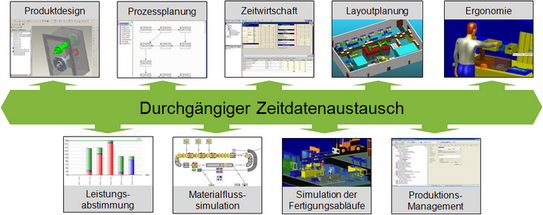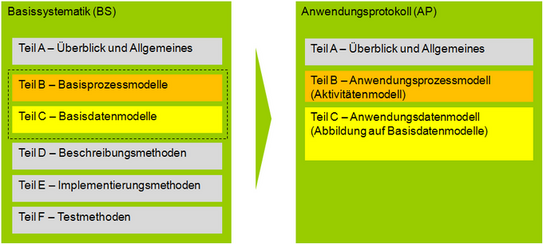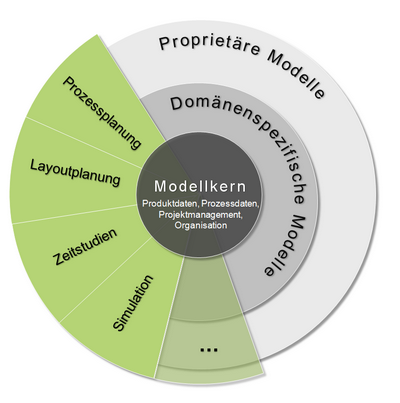ADiFa
Application Protocol for Process Harmonisation in the Digital Factory

Problem
Manufacturing companies are increasingly using digital planning tools in product creation to respond to increasing cost and time pressure. This affects both companies with variant-rich series production and small and medium-sized enterprises with predominantly individual, small and medium series production. In this context, the digital factory is becoming increasingly important.
The term "digital factory" describes the continuous use of IT tools and digital models in all phases of product creation. However, the potentials of the digital factory, such as improving planning quality, improving economic efficiency and shortening time-to-market, can only be fully exploited if it is possible to combine all relevant and previously isolated digital methods, tools and models into an integrated overall planning system. This concerns both the technical and the organisational interfaces within the entire product creation process.
At present, however, it can be seen that many software solutions have only a limited ability to offer or obtain planning data consistently in a heterogeneous system landscape. This fact is due to the lack of conformity of the interfaces and the resulting lack of integration of all necessary planning data. Furthermore, the inadequate networking of the planners and partners involved in the process contributes to the existing problems.
Objective
The aim of the planned research project is to develop an application-specific data model for process harmonisation in the digital factory. Based on the ISO 10 303 (STEP) series of standards, this is called an "application protocol". The claim of this protocol lies in the central description of the relevant product, process and resource information accruing during the product creation process. Associated with this are:

- Ensuring consistency and freedom from redundancy in the overarching or multidisciplinary development process.
- Mastering the complexity of product development
- Shortening planning times by supporting simultaneous engineering and collaborative engineering.
- Ensuring the quality of planning and its results.
The management of time data plays a key role in the digital factory. Time data are decisive variables for the description of processes and represent an essential database of the digital factory. Due to their relation to both product development and production, time data become a connecting element in the data network of product creation. Despite the great importance of time data in product creation, there is a lack of concepts with which a computer-supported, efficient and continuous provision of time data is possible, especially in the planning phase of products. For this reason, the joint project ADiFa is working on the concrete and exemplary realisation of an application protocol for the exchange of time data. The goal here is to network the application area of time management with the other planning functions and areas of the digital factory. The basis for this is formed by consistently available time data, as shown in the following figure, which is specified via the application protocol for time management.
Procedure
To support the development of application protocols, a generally applicable basic system is being developed in this research project. This basic system can be seen as a kind of "toolbox" that contains all the essential methods and definitions for the development of application-specific application protocols. Based on this generally valid basic system, application-specific application protocols can be defined.

The procedure for developing the application protocol is based on the methodology for developing application protocols within the STEP standard ISO 10 303. The project is implemented using the following work steps: In the first step, a general systematisation of the planning data and objects of the digital factory is carried out. In the second step, the processes with time data reference are analysed in depth within the framework of the digital factory in order to create an activity model of the processes. Next, the requirements for the exchange of time data are analysed. This includes determining which time data must be available in which planning step and with what accuracy. Based on this, the data model or the application protocol of the time data is modelled. After defining and specifying the application protocol, the implementation of interfaces in standard software of the digital factory and time management and its validation is carried out.

Publications
- Petzelt, D.; Magenheimer, K.; Schallow, J.; Wiedemann, M.; Deuse, J.; Reinhart, G.: Process Harmonisation Based on Application Protocols, Proceedings of 3rd International Conference on Changeable, Agile, Reconfigurable and Virtual Production (CARV 2009), 05.-07.10.2009, München, S. 758-768.
- Petzelt, D.; Schallow, J.; Ebert, K.; Weidle, H.: Integration zeitwirtschaftlicher Funktionen in die Digitale Fabrik, MTM-Aktuell 14 (2009) 43, S. 21-22.
- Petzelt, D.; Schallow, J.; Deuse, J.; Rulhoff, S.: Anwendungsspezifische Datenmodelle in der Digitalen Fabrik, ProduktDaten Journal 16 (2009) 1, S. 45-48.
- Deuse, J.; Petzelt, D.; Schallow, J.; Reinhart, G.; Wiedemann, M.; Magenheimer, K.: Anwendungsprotokoll zur Prozessharmonisierung in der Digitalen Fabrik auf Basis von Anwendungsprotokollen, ZWF Zeitschrift für wirtschaftlichen Fabrikbetrieb 104 (2009) 1-2, S. 11-15.
- Petzelt, D.: Verbundprojekt: ADiFa - Anwendungsprotokoll zur Prozessharmonisierung in der Digitalen Fabrik, MTM-Bundestagung, 23.10.2008.
- Reinhart, G.; Wiedemann, M.: Projektvorstellung: ADiFA - Anwendungsprotokoll zur Prozessharmonisierung in der Digitalen Fabrik. Berliner Kreis Newsletter (2/2008) 11, S. 8.
Research- and Development Partner
Institute for Machine Tools and Industrial Management (iwb), Technical University of Munich
Faculty of Mechanical Engineering, Augsburg University of Applied Sciences
Siemens Product Lifecycle Management II (DE) GmbH
Deutsche MTM-Gesellschaft Industry and Business Consultancy mbH
GIGATRONIK Munich GmbH
Daimler AG, Mannheim Plant
PROSTEP AG
Funding Reference
This research and development project is funded by the Federal Ministry of Education and Research within the framework concept "Research for the Production of Tomorrow" and is supervised by the Project Management Agency Forschungszentrum Karlsruhe, Production and Manufacturing Technologies Division.


![[Translate to English:] [Translate to English:]](/storages/zentraler_bilderpool/_processed_/2/6/csm_Altes_Maschinenbau-Gebaeude_3a1a87015a.jpg)